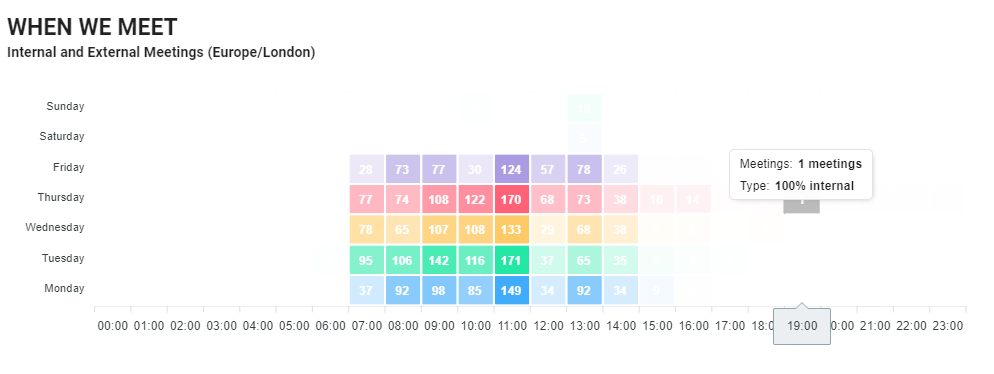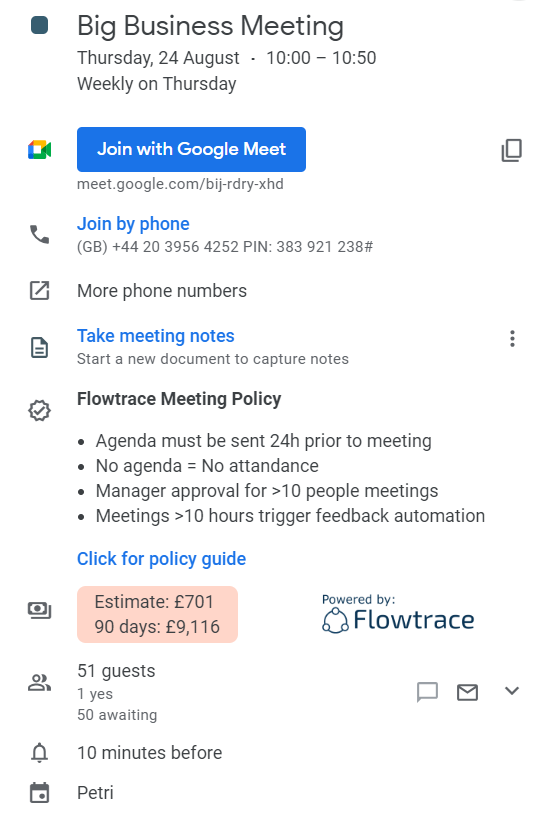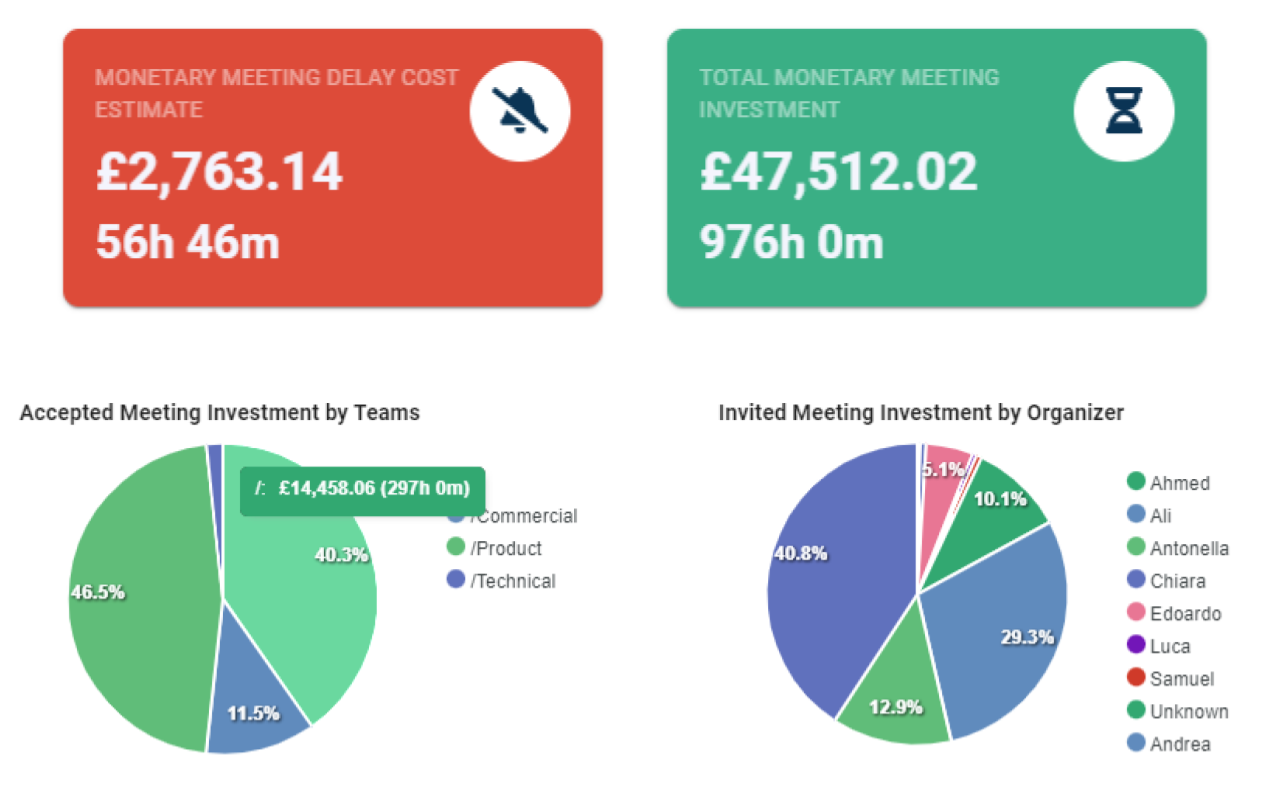Google Calendar Analytics: Drive Meeting Performance
Optimize your team's meeting efficiency and productivity with Flowtrace's Google Calendar analytics, transforming calendar data into actionable...
Improve your productivity and time management with calendar analysis. Flowtrace's calendar analytics can optimize scheduling and enhance meeting culture.
Effective time management is a key component of productivity and success and your Google Calendar is an essential part of that. Yet, utilizing calendar planning and meeting scheduling to its full potential comes with its own set of challenges. Striking the right balance, avoiding overbooking, and optimizing your calendar for peak efficiency can be difficult for leaders. That's where Flowtrace steps in as a solution with calendar analytics, empowering leaders to unlock the true potential of scheduling amongst teams and transforming meeting culture within an organization.

According to Doodle, 71% of professionals lose time every week due to unnecessary, irrelevant or canceled meetings. By undergoing a calendar audit and using calendar analytics, leaders can reduce the time lost by promoting a healthy meeting culture. Often, leaders rely on a calendar as a reminder of meetings and schedules, never as a tool that can be optimized to encourage productivity, reduce organizational costs, and improve meeting culture.
A study by the American Productivity & Quality Center found that 67% of professionals believe that calendar analysis can help them improve their productivity.
Your calendar is a reflection of your commitments, priorities, and the allocation of your most valuable resource—time. Analyzing your Google Calendar can empower you toward improved time management and heightened productivity. It allows you to:
Calendar analysis can offer solutions to several common scheduling challenges, including:
Gaining insights into your calendar data offers several benefits:
Flowtrace is a powerful tool with its calendar analytics. In this instance, it can help to understand meeting culture and meeting costs through Google Calendar.
The standout feature is its meeting cost calculator for Google Calendar, designed to provide managers with a clear understanding of the financial implications of their meetings as they are scheduled.
This solution automates the process of estimating the cost of meetings directly within Google Calendar. It integrates seamlessly with our meeting analytics, enhancing its functionality by utilizing advanced analytics to offer accurate and comprehensive cost estimates.

However, we take this a step further. Benchmarking these costs against similar companies of the same type and size provides contextual insight into your meeting culture. This is about making this data meaningful and actionable for your team.
Our app also seamlessly integrates with an extensive suite of productivity tools like Slack, Google Workspace, Zoom, and Jira, to name a few. This compatibility allows Flowtrace to analyze your team's workflow holistically, incorporating various facets of your workday into its robust analysis.
You can save a lot of manual time by using Flowtrace to audit your calendar. Flowtrace is a calendar audit tool that automatically analyzes meeting duration and participation, and categorizes and shows you the most expensive meetings of the company. We also provide a toolkit for your employees to rate the meetings they attend, or ask for feedback from meetings they organize.
This includes metrics like:

Effective calendar management goes beyond scheduling, it involves optimizing the use of your most essential resource—time. Time analysis is a crucial aspect of calendar management, as it offers insights into how your time is allocated, helping you make informed decisions and enhance productivity. It allows you to:
Our app focuses on data for time spent in various calendar activities, providing users with invaluable insights:
We empower users by generating comprehensive reports and actionable insights from their Google Calendar data. These insights can help drive better time management, optimize resource allocation, and enhance overall productivity.
Our capabilities help in the enhancement of time management:

Flowtrace's capacity to generate actionable insights and detailed reports transforms your Google Calendar into a strategic asset. By analyzing calendar data, you gain a deeper understanding of time allocation, enabling better decision-making, improved time management, and enhanced productivity.
Effective calendar analysis and optimization require a proactive approach. Here are some best practices to consider:
In conclusion, the critical importance of calendar analysis in management is highlighted and can impact a team's productivity. Your calendar is not just a tool for scheduling, it can provide the opportunity to boost your team's output, save costs, and improve culture. Explore Flowtrace's integration with Google Calendar as a valuable tool for enhancing their time management and productivity.
Optimize your team's meeting efficiency and productivity with Flowtrace's Google Calendar analytics, transforming calendar data into actionable...
Explore calendar analytics options, learn pros and cons, how to choose the right approach, and discover Flowtrace's real-time insights benefits.
Discover the power of calendar analytics to optimize your schedule and boost productivity. Learn how tools like Flowtrace can automate this process.